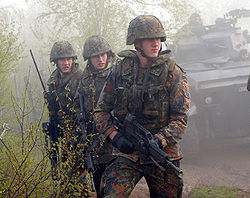Soldier
 |
|
| German soldiers in Bosnia | |
| Occupation | |
|---|---|
| Type | Profession |
| Activity sectors | Military |
| Description | |
| Competencies | Physical Stamina Mindset |
| Fields of employment | Army |
| Related jobs | Commando SWAT Police officer Mercenary |
A soldier is a member of the land component of national armed forces; whereas a soldier hired for service in a foreign army would be termed a mercenary.[1] In most languages, "soldier" includes commissioned and non-commissioned officers in national land forces.
Contents |
Etymology
The word soldier entered modern English in the 14th century, from the equivalent Middle English word soudeour, from Anglo-French soudeer or soudeour, meaning mercenary, from soudee, meaning shilling's worth or wage, from sou or soud, shilling.[2] The word is also related to the Medieval Latin soldarius, meaning soldier (literally, "one having pay").[3] These words were ultimately derived from the Late Latin word solidus, referring to an Ancient Roman coin used in the Byzantine Empire.[2][3]
Occupational designations
In most armed forces use of the word soldier has taken on a more general meaning, due to the increasing specialization of military occupations that require different areas of knowledge and skill-sets. As a result, "soldiers" are referred to by names or ranks which reflect an individual's military occupation specialty Arm, Service or Branch of military employment, their type of unit, or operational employment or technical use such as: trooper, tanker, Commando, dragoon, infantryman, Marine, paratrooper, ranger, sniper, engineer, sapper, or a gunner.
Other terms
In many countries soldiers serving in specific occupations are referred to by terms other than their occupational name. For example military police personnel in the U.K. are known as "redcaps" from the colour of their berets or other headwear.
In the United States Army and the United States Marine Corps, infantrymen are called "grunts," while artillerymen are sometimes referred to as "redlegs," from the branch color for artillery.
French Marine Infantry are called marsouins (porpoises) because of their amphibious role. Military units in most armies have nicknames of this type, arising either from items of distinctive uniform, some historical connotation or rivalry between branches or regiments.
For example, U.S. Marines are sometimes called jar-heads because of their "high and tight" haircuts and the way they wear their hats makes their heads look like the cap of a jar or decanter.
See also
References
- ↑ "mercenary." The American Heritage Dictionary of the English Language, Fourth Edition. Houghton Mifflin Company, 2004. 16 May 2009. <Dictionary.com http://dictionary1.classic.reference.com/browse/mercenary>.
- ↑ 2.0 2.1 Mish, Frederick C., ed (2004). "soldier". Merriam-Webster's Collegiate Dictionary (11th edition ed.). Springfield, MA: Merriam-Webster. ISBN 0-87779-809-5.
- ↑ 3.0 3.1 Harper, Douglas (2010). "Online Etymology Dictionary". http://www.etymonline.com/. Retrieved 17 August 2010.